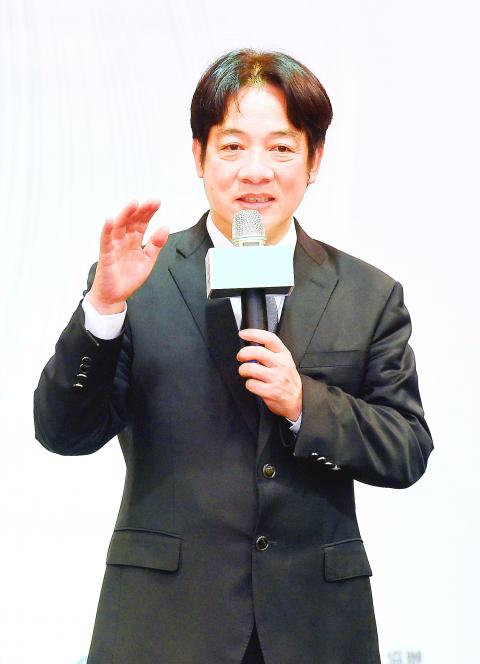As criticism from pro-Taiwan independence groups over the Democratic Progressive Party (DPP) government’s handling of a referendum on the national team’s name at the 2020 Tokyo Summer Olympics mounts in cyberspace, Premier William Lai (賴清德) yesterday defended his commitment to a pragmatic approach to Taiwanese independence.
An alliance of civic groups has initiated a referendum drive on renaming the national sports team from “Chinese Taipei” to “Taiwan” at the Tokyo Olympics and other competitions.
The DPP government’s perceived lack of support for the referendum has prompted charges that Lai is foxi (佛系) about Taiwanese independence, a Chinese Internet slang term referring to Buddha-like passivity and indifference toward a goal.

Photo: Chu Pei-hsiung, Taipei Times
Quoting Lai’s description of himself as a “political worker for Taiwanese independence” when he fielded questions from lawmakers at the Legislative Yuan in September last year, a group of pro-localization organizations last month called for Lai to lend his support to the proposed referendum.
In an interview yesterday with Web-based Yahoo TV, Lai said that Taiwanese independence through pragmatism is derived from and defined by the DPP’s “Resolution on Taiwan’s Future” ratified in 1999.
The resolution states that Taiwan is a sovereign and independent nation named the Republic of China (ROC) that is neither a subordinate of China, nor seeks to subjugate China, whose future can only be determined by the will of its people, he said.
There is nothing wrong with advocacy for renaming the nation’s Olympic team to “Taiwan,” Lai said, adding that proposal organizer Chi Cheng (紀政) competed under that name as an Olympian in 1960, 1964 and 1968.
However, while the government respects the advocates’ views, it is bound by the Lausanne Agreement, in which Taiwan’s Olympic committee consented to participate in Olympics under the name “Chinese Taipei,” he said.
“A lot of people are understandably dissatisfied that Taiwan has to participate in the Olympics as ‘Chinese Taipei’ under the terms of the Lausanne Agreement, but this is the reality of the situation and we have to protect our right to have our athletes participate in the Olympics,” he said.
Lai also said that the Cabinet is committed to President Tsai Ing-wen’s (蔡英文) cross-strait policy directives.
He reiterated Tsai’s official line that there would be no changes in goodwill, no changes in promises, no reversion to confrontation, no bowing to pressure and no compromising national sovereignty for expedient short-term interests that would jeopardize Taiwan’s free and democratic way of life.

The Ministry of Education (MOE) is to launch a new program to encourage international students to stay in Taiwan and explore job opportunities here after graduation, Deputy Minister of Education Yeh Ping-cheng (葉丙成) said on Friday. The government would provide full scholarships for international students to further their studies for two years in Taiwan, so those who want to pursue a master’s degree can consider applying for the program, he said. The fields included are science, technology, engineering, mathematics, semiconductors and finance, Yeh added. The program, called “Intense 2+2,” would also assist international students who completed the two years of further studies in

The brilliant blue waters, thick foliage and bucolic atmosphere on this seemingly idyllic archipelago deep in the Pacific Ocean belie the key role it now plays in a titanic geopolitical struggle. Palau is again on the front line as China, and the US and its allies prepare their forces in an intensifying contest for control over the Asia-Pacific region. The democratic nation of just 17,000 people hosts US-controlled airstrips and soon-to-be-completed radar installations that the US military describes as “critical” to monitoring vast swathes of water and airspace. It is also a key piece of the second island chain, a string of

Taiwan will now have four additional national holidays after the Legislative Yuan passed an amendment today, which also made Labor Day a national holiday for all sectors. The Chinese Nationalist Party (KMT) and Taiwan People’s Party (TPP) used their majority in the Legislative Yuan to pass the amendment to the Act on Implementing Memorial Days and State Holidays (紀念日及節日實施辦法), which the parties jointly proposed, in its third and final reading today. The legislature passed the bill to amend the act, which is currently enforced administratively, raising it to the legal level. The new legislation recognizes Confucius’ birthday on Sept. 28, the

A magnitude 5.9 earthquake that struck about 33km off the coast of Hualien City was the "main shock" in a series of quakes in the area, with aftershocks expected over the next three days, the Central Weather Administration (CWA) said yesterday. Prior to the magnitude 5.9 quake shaking most of Taiwan at 6:53pm yesterday, six other earthquakes stronger than a magnitude of 4, starting with a magnitude 5.5 quake at 6:09pm, occurred in the area. CWA Seismological Center Director Wu Chien-fu (吳健富) confirmed that the quakes were all part of the same series and that the magnitude 5.5 temblor was